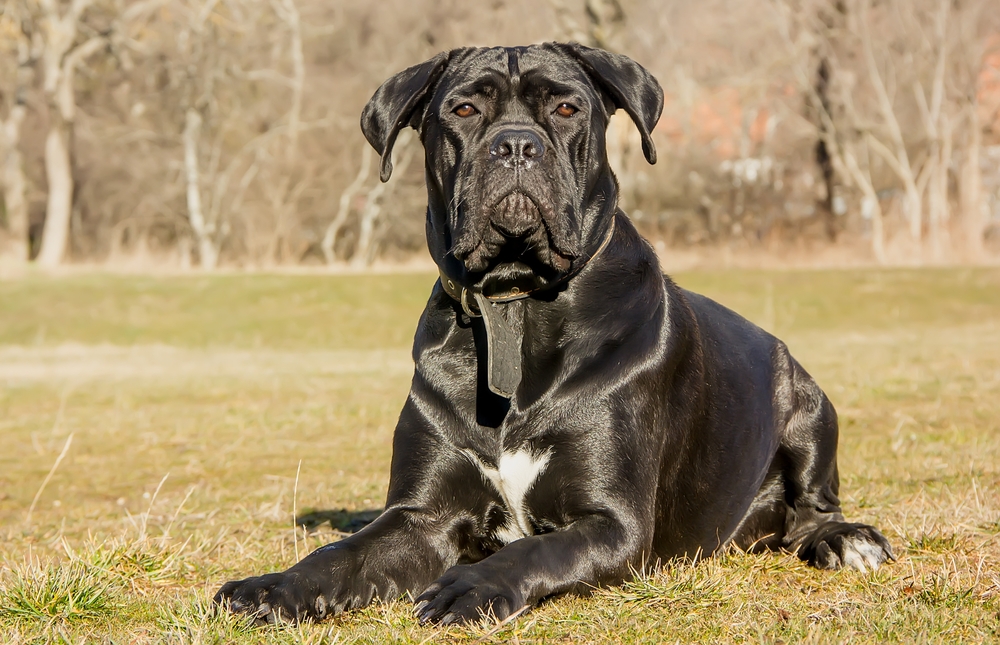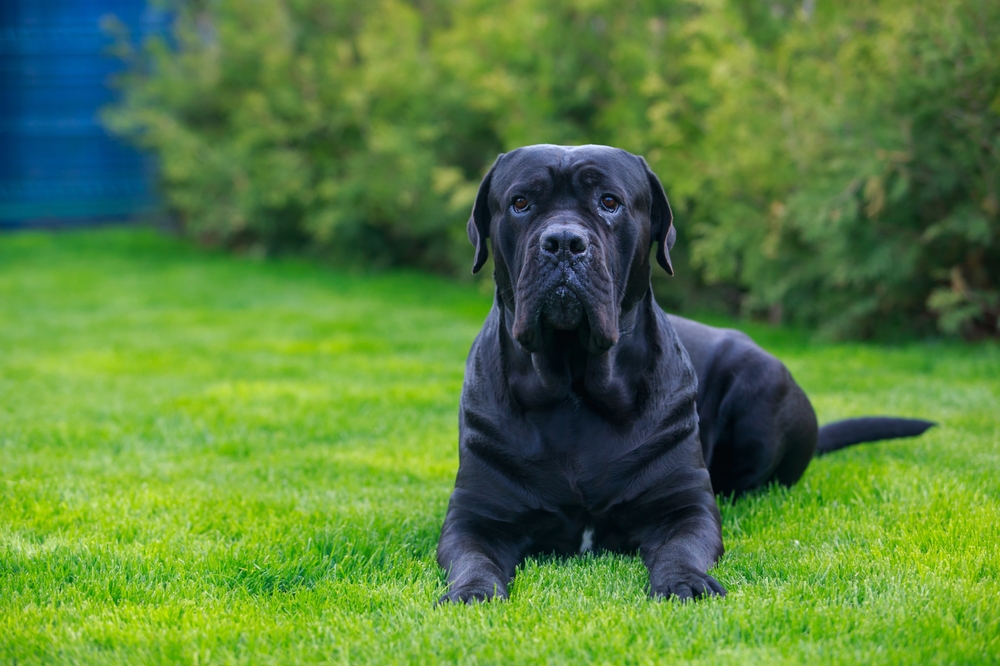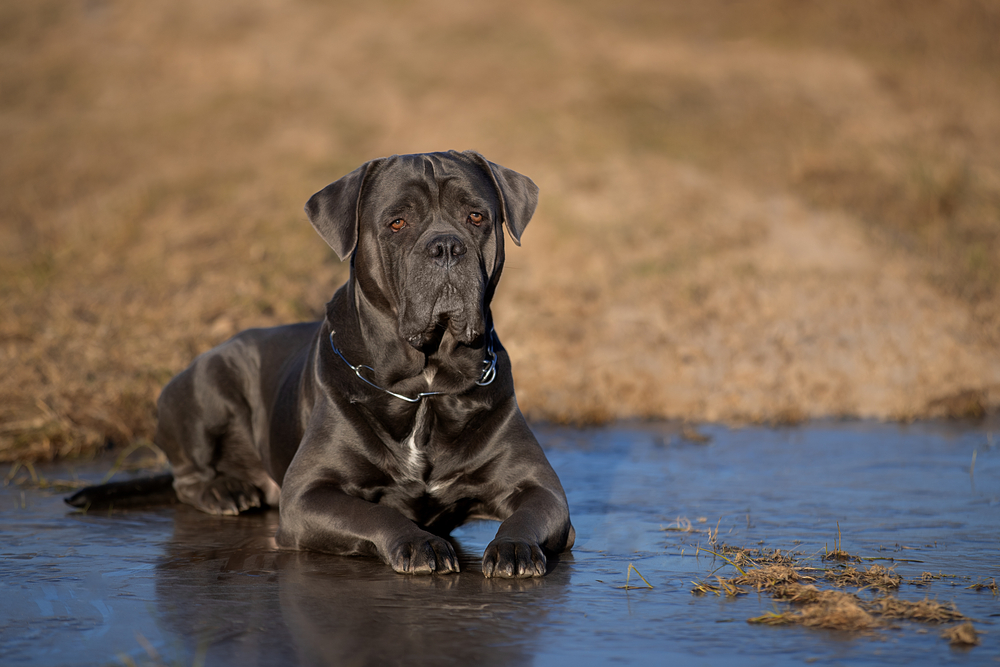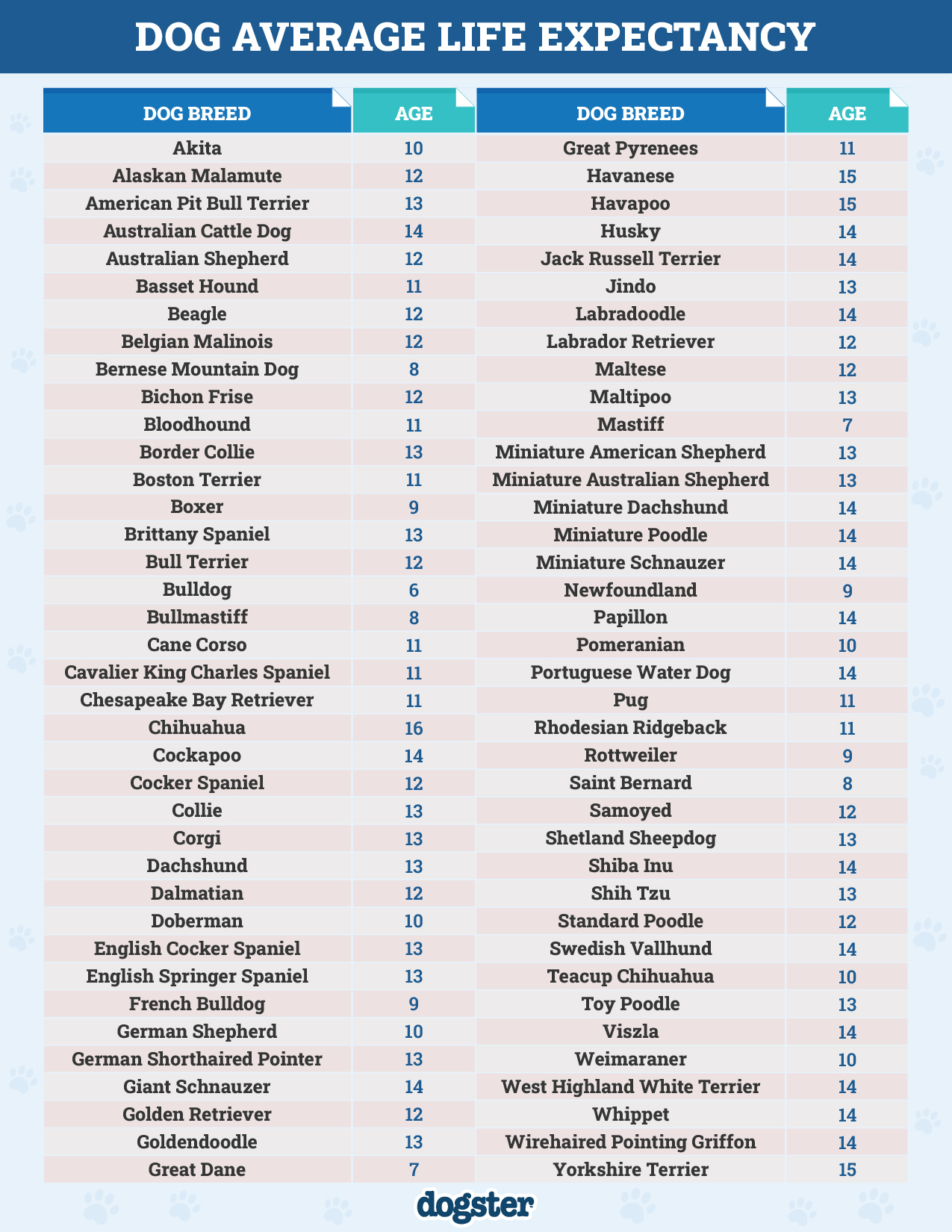In this article
View 3 More +Cane Corso dogs are smart, affectionate, and assertive. These working dogs can grow to 110 pounds or more, making them a large breed. So, how long do Cane Corsi live? Because they are a large breed, Cane Corsi will live shorter lives than their small dog counterparts. The average Cane Corso lifespan is between 9 and 12 years.
Keep reading to learn about the average lifespan of these wonderful family companions and protectors and to find out what factors play a part in the breed’s longevity.

What’s the Average Cane Corso Lifespan?
The average Cane Corso lifespan is between 9 and 12 years, which is average for a large-sized breed. However, one study from 2017 found that the median lifespan of this breed is 9.29 years.1 This study also suggests that there may be a correlation between lifespan and color.
The research shows that black brindle and brindle Cane Corso dogs tend to live longer (10.30 years and 10.13 years, respectively) than their fawn, grey brindle, black, and grey counterparts.


Why Do Some Cane Corso Live Longer Than Others?
1. Nutrition
Nutrition can play a huge role in the lifespan of a Cane Corso. Therefore, this large breed needs a high-quality, age-appropriate diet to meet their nutritional needs. A poor diet can cause serious repercussions, such as obesity, pancreatitis, bladder stones, heart disease, and diarrhea.
Cane Corso dogs should only be fed a grain-free diet under the advice of a veterinary team. This is because grain-free diets may be linked to cases of non-hereditary dilated cardiomyopathy and aren’t typically necessary unless a dog is allergic to grains.
If you need to speak with a vet but can't get to one, head over to PangoVet. It's our online service where you can talk to a vet online and get the personalized advice you need for your pet — all at an affordable price!

2. Environment and Conditions
A Cane Corso that lives in a well-maintained environment with humans that treat them right and care about their well-being will typically live much longer than one that lives in a less than ideal situation. An ideal environment would include adequate exercise and mental enrichment, proper veterinary care, and socialization.
3. Indoor/Outdoor Lifestyle
Cane Corsi need moderate exercise, roughly two walks per day, to keep them in tip-top shape. They make great hiking, running, and walking companions, but should always be kept on a leash to keep themselves and nearby humans and pets safe.
A Cane Corso should never be left outside on their own. This can not only lead to several bad habits, such as endless barking and destructive digging, but it can also cause hostility and aggression especially if they don’t have proper stimulation and socialization.
4. Size
Because Cane Corsi are a larger breed, they have a similar lifespan as other large breed dogs. Studies show that the bigger the dog is, the faster they will age.2 These studies also suggest that larger breeds die more often from cancer than their smaller counterparts.3 The researchers suppose this may be true because selective breeding for size has increased their risk of developing cancer.
5. Sex
No studies show whether female or male Cane Corsi live longer. Generally speaking, female dogs tend to live longer than their male counterparts.4
6. Genes
Cane Corsi are generally healthy, as most reputable breeders will screen their dogs for common genetic health conditions before breeding them. That said, several health issues could impact the longevity or quality of life of a Cane Corso, including:
- Obesity
- Hip dysplasia
- Idiopathic epilepsy
- Bloat

7. Neuter or Spay Status
There are a lot of benefits to neutering or spaying your Cane Corso with the main advantage being they tend to live longer. They are also less likely to develop certain types of cancer, such as mammary and testicular, and even less likely to develop some types of infections.
Spaying and neutering can also decrease behaviors that may reduce a dog’s lifespan, particularly aggression and wandering.
8. Health Care
Regular trips to the vet are an absolute must for any pet in your care. This will provide your vet with a baseline they can then use to gauge your dog’s health in the future. If you have any concerns regarding your Cane Corso, their needs, or their health, be sure to bring it to your vet’s attention. The sooner you can catch any potential health conditions or diseases, the better.

The 4 Life Stages of a Cane Corso
1. Puppy (0–6 Months)

In the first 6 weeks of life, Cane Corsi puppies learn about social contact and play from their mom and littermates. So, it’s also important for breeders to handle the puppies in these first crucial weeks so they can learn to connect more with humans.
Cane Corsi pups grow a lot in the first 6 months of their lives. Males can be as heavy as 65 pounds and females 60 pounds by the time they turn 6 months old.
2. Junior (6–12 Months)

Cane Corsi will reach sexual maturity in this time frame and grow their thicker adult coats. It’s important to continue building on your dog’s confidence through training and socialization at this stage.
By their first birthday, male Cane Corso dogs can weigh up to 95 pounds, while females may tip the scales at 90 pounds.
3. Adult (1–7 Years)

Between 15 to 18 months, Cane Corso pups will reach emotional maturity. They will understand that they are a member of a pack, consisting of you and potentially other animals.
Some Cane Corso dogs will reach their full mature height by the time they’re one, while others need a full 2 years to fill out. Full-grown male Cane Corsi can weigh 110 pounds or more, while females tend to hover around the 100-pound range.
4. Mature (7+ Years)

A Cane Corso is considered a senior around the time they turn 7 years old. As with humans, aging dogs may be more likely to begin displaying signs of illness or health conditions like joint issues. In addition, you may notice your pup slowing down a bit, greying around the muzzle, or suffering from cognitive decline.

How to Tell Your Cane Corso’s Age
If you don’t have an exact birth date for your Cane Corso, it can be challenging to know their actual age. You’ll need to do some detective work to make an educated guess.
Examining your dog’s teeth is the most reliable way to guesstimate age. Puppies between 4 and 8 weeks have needle-sharp teeth, while those around 4–6 months old will have bright and clean permanents. By the time they’re 1 year old, teeth start to show some wear through staining and plaque which can increase with age.
Looking at the coat may provide some guidance as well. For example, older dogs often start going a little grey or white on their muzzles or chest. Some dogs may also get cloudy eyes or poor hearing as they age.


In Conclusion
Cane Corsi are large dogs with a lifespan that rivals that of other breeds their size. Generally speaking, they are a mostly healthy breed, apart from a few potentially problematic genetic conditions. As a result, most Cane Corso dogs should live between 9 and 12 years.
Featured Image Credit: Dora Zett, Shutterstock






















